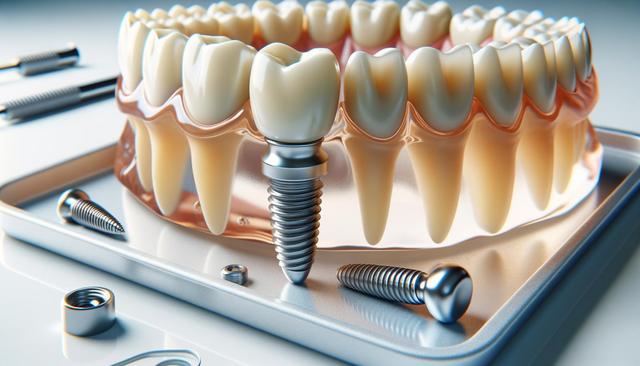Understanding What Dental Implants Are
Dental implants are artificial tooth roots made from biocompatible materials, such as titanium, which are surgically inserted into the jawbone. They serve as a sturdy base for supporting replacement teeth like crowns, bridges, or dentures. Over time, the implant fuses with the bone through a process called osseointegration, providing a stable and long-lasting solution for missing teeth. Unlike removable dentures, dental implants are fixed in place, offering a more natural look and feel.
The structure of a dental implant typically includes three parts: the implant post (which is inserted into the jawbone), the abutment (a connector between the post and the crown), and the dental crown (the visible part that resembles a natural tooth). This multi-component system makes implants a customizable and comprehensive option for tooth replacement. They are commonly used for single-tooth replacements, multiple missing teeth, or even full mouth reconstructions.
Who Can Benefit from Dental Implants?
Dental implants are suitable for a wide range of individuals who have one or more missing teeth. However, not everyone is an ideal candidate. A thorough dental consultation is essential to determine eligibility. Candidates typically need to have:
- Good overall health and oral hygiene
- Adequate jawbone density to support the implant
- No untreated gum disease or chronic conditions that could affect healing
- A non-smoking lifestyle or willingness to quit during the healing phase
Even in cases where the jawbone is insufficient, bone grafting procedures can sometimes make implant placement possible. Age is not necessarily a limiting factor; many older adults are successful implant recipients. However, implants are not recommended for children and adolescents whose jawbones are still developing.
For individuals who struggle with ill-fitting dentures or bridges, implants can offer significant improvements in comfort, function, and confidence. They allow for better speech, chewing efficiency, and overall oral health by preventing bone deterioration that typically follows tooth loss.
Are Dental Implants Safe?
Dental implants have a strong track record for safety and effectiveness. When performed by qualified professionals using proper techniques and sterilized equipment, the procedure carries minimal risks. Success rates for dental implants are generally high, often exceeding 95% when proper care and follow-up are maintained.
That said, like any surgical procedure, there are potential complications, including:
- Infection at the implant site
- Nerve damage causing pain or numbness
- Sinus issues (for upper jaw implants)
- Implant failure due to poor bone integration
These risks can be minimized through careful planning, thorough assessments, and adherence to post-operative care instructions. Additionally, regular dental checkups and good oral hygiene practices contribute significantly to the long-term success of dental implants. Advances in dental technology and materials continue to enhance safety measures, making implants a well-regarded solution in restorative dentistry.
Financial Considerations and Value
One of the most common concerns surrounding dental implants is cost. Generally speaking, implants tend to have a higher upfront cost compared to traditional dentures or bridges. However, it’s important to view the investment in the context of long-term benefits. Implants are designed to last many years, often decades, with proper care—potentially reducing the need for replacements or adjustments over time.
The cost of dental implants can vary based on several factors:
- Geographic location and clinic pricing
- The number of implants needed
- Additional procedures (like bone grafting)
- Type and quality of materials used
Some dental insurance plans may offer partial coverage for implants or related procedures, though this varies widely. Many clinics also provide financing options to make treatment more accessible. When considering the durability, functionality, and aesthetic value, many patients find that dental implants offer a worthwhile return on investment over the long run.
What to Expect During the Procedure
The process of getting dental implants typically involves multiple stages and can span several months. The timeline allows for adequate healing and integration of the implant with the jawbone. Here’s a general overview of what to expect:
- Initial consultation and imaging (X-rays or CT scans)
- Tooth extraction (if needed)
- Bone grafting (if necessary)
- Implant placement surgery under local anesthesia
- Healing period of several weeks to months
- Attachment of the abutment and crown
During the healing phase, patients may experience mild discomfort, swelling, or bruising—symptoms that can usually be managed with over-the-counter pain relief and proper care. Following your dentist’s instructions is crucial for the success of the implant. Once the procedure is complete, the implant functions just like a natural tooth and requires the same level of care, including regular brushing, flossing, and dental checkups.
Conclusion: Is a Dental Implant Right for You?
Dental implants offer a reliable, long-term solution for those facing tooth loss, with benefits that extend beyond aesthetics to include improved function and oral health. While they may not be the right choice for everyone, many individuals find implants to be a valuable alternative to traditional dentures or bridges. Understanding the procedure, costs, and expectations can help you make an informed decision based on your personal dental needs and lifestyle.
If you’re considering dental implants, a consultation with a qualified dental professional is the first step. They can evaluate your situation, discuss treatment options, and guide you through the process. With proper planning and care, dental implants can contribute significantly to your quality of life and long-term oral health.








